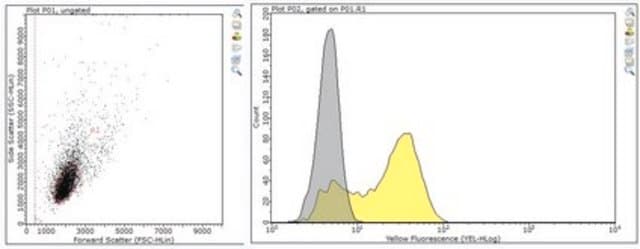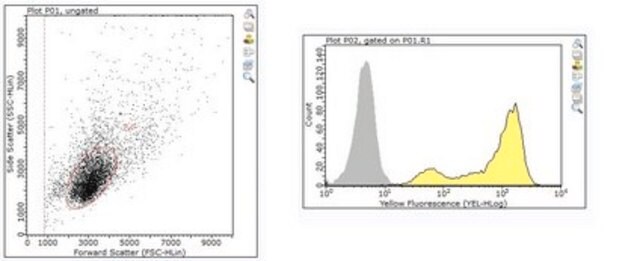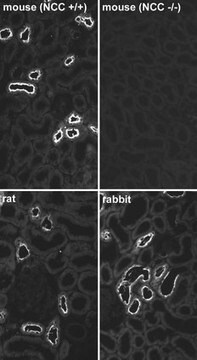MAB8727
Anti-Rabies Antibody, Glycoprotein, clone 24-3F-10
clone 24-3F-10, Chemicon®, from mouse
Sign Into View Organizational & Contract Pricing
All Photos(1)
About This Item
UNSPSC Code:
12352203
eCl@ss:
32160702
NACRES:
NA.41
Recommended Products
biological source
mouse
Quality Level
antibody form
purified immunoglobulin
antibody product type
primary antibodies
clone
24-3F-10, monoclonal
species reactivity
vertebrates
manufacturer/tradename
Chemicon®
technique(s)
immunofluorescence: suitable
western blot: suitable
isotype
IgG2a
shipped in
wet ice
General description
Monoclonal rabies antibody 24-3F-10 is an immunoglobulin molecule of the IgG2a class that has a strong affinity for an epitope (antigenic site) on the rabies glycoprotein (G) molecule of the ERA vaccine strain of rabies virus. It has proven to be effective in the identification and
quantification of the rabies
immunizing antigen in the
production of rabies vaccine by
recombinant technology.
quantification of the rabies
immunizing antigen in the
production of rabies vaccine by
recombinant technology.
Specificity
Rabies glycoprotein.
Immunogen
Epitope: Glycoprotein
Vaccine strain ERA
Application
Anti-Rabies Antibody, Glycoprotein, clone 24-3F-10 detects level of Rabies & has been published & validated for use in IF & WB.
Immunofluorescence.
Optimal dilutions must be determined by the end user.
Optimal dilutions must be determined by the end user.
Research Category
Infectious Diseases
Infectious Diseases
Research Sub Category
Infectious Diseases - Viral
Infectious Diseases - Viral
Physical form
Format: Purified
Purified immunoglobulin. Liquid in 0.02M PB, 0.25M sodium chloride with 0.1% sodium azide as a preservative.
Storage and Stability
Store at 2 to 8°C for up to 12 months from date of receipt.
Other Notes
Concentration: Please refer to the Certificate of Analysis for the lot-specific concentration.
Legal Information
CHEMICON is a registered trademark of Merck KGaA, Darmstadt, Germany
Disclaimer
Unless otherwise stated in our catalog or other company documentation accompanying the product(s), our products are intended for research use only and are not to be used for any other purpose, which includes but is not limited to, unauthorized commercial uses, in vitro diagnostic uses, ex vivo or in vivo therapeutic uses or any type of consumption or application to humans or animals.
Not finding the right product?
Try our Product Selector Tool.
Storage Class Code
10 - Combustible liquids
WGK
WGK 2
Flash Point(F)
Not applicable
Flash Point(C)
Not applicable
Certificates of Analysis (COA)
Search for Certificates of Analysis (COA) by entering the products Lot/Batch Number. Lot and Batch Numbers can be found on a product’s label following the words ‘Lot’ or ‘Batch’.
Already Own This Product?
Find documentation for the products that you have recently purchased in the Document Library.
Guofen Ma et al.
Science advances, 7(20) (2021-05-16)
Sensory processing is subjected to modulation by behavioral contexts that are often mediated by long-range inputs to cortical interneurons, but their selectivity to different types of interneurons remains largely unknown. Using rabies-virus tracing and optogenetics-assisted recording, we analyzed the long-range
Johnny Phong Do et al.
eLife, 5 (2016-09-20)
The basal forebrain (BF) plays key roles in multiple brain functions, including sleep-wake regulation, attention, and learning/memory, but the long-range connections mediating these functions remain poorly characterized. Here we performed whole-brain mapping of both inputs and outputs of four BF
Zhiyuan Gong et al.
PLoS neglected tropical diseases, 17(4), e0011254-e0011254 (2023-04-24)
Rabies, caused by the rabies virus (RABV), is an ancient and neglected zoonotic disease posing a large public health threat to humans and animals in developing countries. Immunization of animals with a rabies vaccine is the most effective way to
Kevin T Beier et al.
Cell reports, 26(1), 159-167 (2019-01-04)
Viral-genetic tracing techniques have enabled mesoscale mapping of neuronal connectivity by teasing apart inputs to defined neuronal populations in regions with heterogeneous cell types. We previously observed input biases to output-defined ventral tegmental area dopamine (VTA-DA) neurons. Here, we further
Regina L Faulkner et al.
eNeuro (2021-06-09)
The Xenopus laevis experimental system has provided significant insight into the development and plasticity of neural circuits. Xenopus neuroscience research would be enhanced by additional tools to study neural circuit structure and function. Rabies viruses are powerful tools to label
Our team of scientists has experience in all areas of research including Life Science, Material Science, Chemical Synthesis, Chromatography, Analytical and many others.
Contact Technical Service







